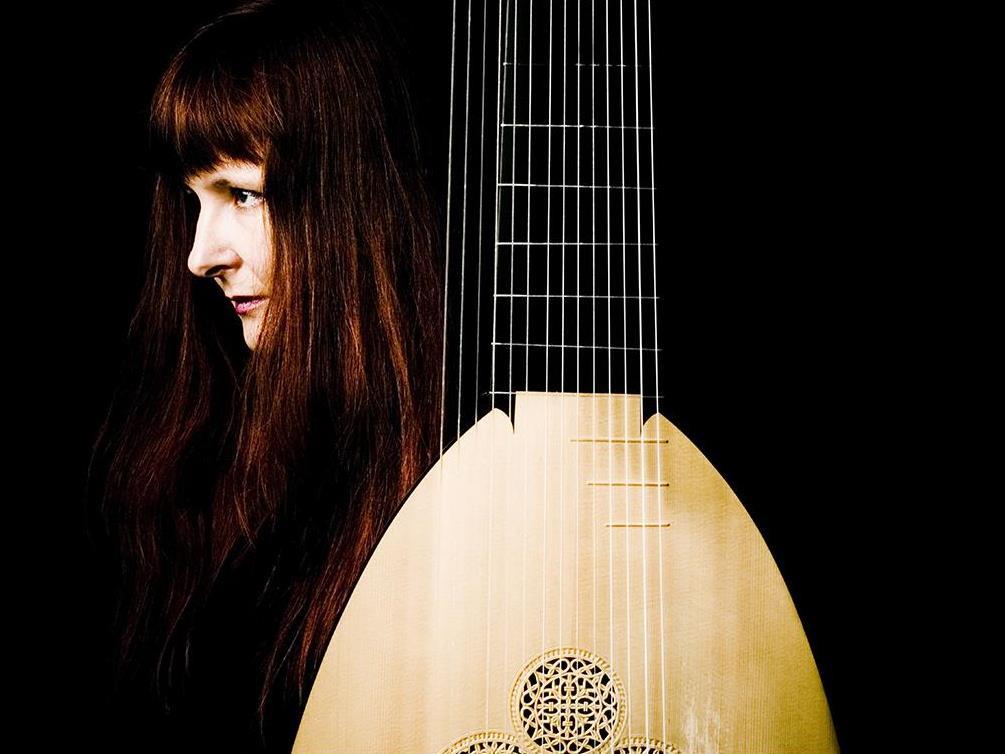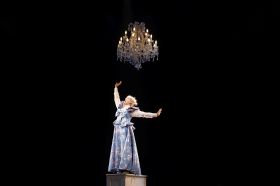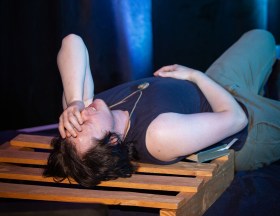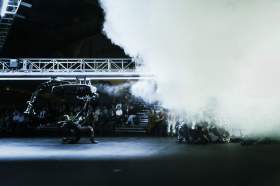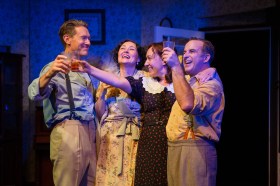Image: Christina Pluhar via Melbourne Recital Centre.
Carefully rereading the publicity for this concert by Baroque Ensemble L’Arpeggiata directed by theorbo player Christina Pluhar provides some clues to the performance practice of this group. ‘Performing on instruments of the period’, the publicity states, ‘we experience brilliant musicians [who] recognise no boundaries, blurring the lines between the score and improvisation, classical and folk, and between old and new’.
Performing at the Melbourne Recital Centre on its way to a tour for Chamber Music New Zealand, the ensemble comprises Céline Scheen, a specialist soprano who has worked with many Baroque luminaries in England and Europe, Vinzenco Capezzuto, falsettist, and eight instrumentalists performing Baroque violin, continuo, cornetto, double bass and percussion. The 20th century double bass raised initial questions for me as did a raft of contemporary percussion instruments including suspended cymbal, brush sticks, Indian frame drums and bongos, among others.
The program advertised was a nicely chosen selection of songs from English theatre music, mainly by Henry Purcell, from the Restoration Period of the late 17th Century. This was a time before opera was known and appreciated in England when plays were interspersed with musical entertainment that resonated with the drama though it had little direct relevance. This was preferred to ‘opera’ that was seen as excessive and peculiar, as noted by the well-researched and nicely argued essay in the printed program quoting Anthony Motteux, ‘Experience hath taught us that our English genius will not relish that perpetual singing’.
The style of this performance became immediately recognised as a crossover between Baroque and jazz, with improvised sets introducing its soloists, pizzicato double bass throughout and bluesy singing of the soloists with pitch bends and slurs. Much of the improvisation over a ground bass involved figuration and harmony that was more Ella Fitzgerald than Henry Purcell.
Céline Scheen has a beautiful voice and her opening Music for a while was full of pathos. Her O, let me forever weep was deeply touching. Strike the viol, however, was far too fast while her Dido’s Lament ‘When I am laid’ came across as excessively histrionic. Vinzenco Capezzuto’s falsetto voice was small, constrained and shrill. A terrific presence on stage, he carried off Man is for woman made with camp aplomb. The voice became increasingly weak as the 90-minute recital wore on, his performance of Purcell’s glorious and evocative An Evening Hymn on a Ground proving woefully inept.
There was an impromptu Classical Indian drum solo.
The other instrumentalists were generally of high calibre. Of special mention: Christina Pluhar’s elegant theorbo playing, Eero Palviainen’s vibrant and rhythmic Baroque guitar and the superb colouristic playing of violinist Veronika Skuplik. Disappointingly, Doron Sherwin’s cornetto was ropey from start until finish.
Although I don’t believe that English composer Henry Purcell would have recognised one iota of his world from this performance, it was nonetheless thoroughly enjoyed by the large audience who were treated to two encores, including the late Leonard Cohen’s Hallelujah, where they happily joined in the choruses.
Rating: 2 1/2 stars out of 5
Ensemble L’Arpeggiata
Purcell – Music for a While
Christina Pluhar, theorbo and director
Céline Scheen, soprano
Vinzenco Capezzuto, falsettist
Doron Sherwin, cornetto
Veronika Skuplik, Baroque violin
Eero Palviainen, arch lute and Baroque guitar
Boris Schmidt, double bass
Sergey Saprichev, percussion
Haru Kitamika, harpsichord and organ
Francesco Turrisi, harpsichord and organ
Elisabeth Murdoch Hall, Melbourne Recital Centre
Monday, 13 March, 2017
7.30pm

